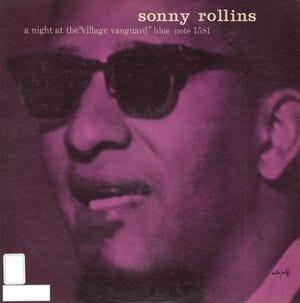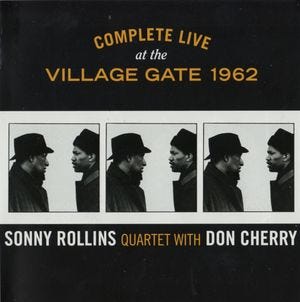Some Jazz Records: Billy Higgins Clippings
Comments on recordings from musicians and other actors of the jazz scene. Random and not-so-random listening cues from the archives.
Billy Higgins credited Louis Jordan drummer Johnny Kirkwood for passing on a great deal of information to him, starting in his childhood in early 1940s Los Angeles. "Most of what he taught me was the language of the music and the love of it," Higgins said in a 1992 Modern Drummer interview. "He introduced me, by way of records, to Duke [Ellington], Bird [Charlie Parker], Max [Roach]. Back then we had 78s. The records didn’t come out too often—maybe three a year—so you had all this time to just zero in on that performance. In all the ages, no prophet got five revelations a month. Since those musical revelations were few and far between, we would lay with it for a long time, till it would soak in. It got to be our everyday thing. When you got up in the morning you put that on and you studied it until you knew every scratch on the record." Asked about early favorites, Higgins answered, "all of Bird’s records, Dizzy [Gillespie]'s records, Miles [Davis] when he started. See, at that time everybody in the neighborhood was doing it, not just myself. It was the music of the neighborhood, so everybody knew when Charlie Parker came out with a new song, or if Thelonious [Monk] or Miles or somebody else came out with something new." Although this Higgins quote doesn’t fit this series’s usual thread of precisely identifiable recordings, it addresses its "raison d’être"!
Sonny Rollins, A Night at the Village Vanguard, Blue Note BLP 1581, 1958, LP; and Sonny Rollins Quartet with Don Cherry, Complete Live at the Village Gate 1962, Solar 4569959, 2015, 6 CDs.
"When I first heard Elvin Jones I went out and got his records," Billy Higgins said in a 1983 Modern Drummer interview. "I heard him first on records before I met him. I had every record he made, and at that time he had made only four or five records. His conception—I said, 'Wait a minute! Without a piano!' That means you’ve got to play the role of the piano." In Elvin Jones’s early discography, Sonny Rollins’s pianoless 1957 live recording at the Village Vanguard stands out. Eventually, Higgins himself would play with Rollins. During a latter Modern Drummer interview, in 1992, Higgins was asked about his recordings with the saxophonist. "There’s a lot of stuff in the can for the label," the drummer answered. "There’s a lot of stuff they have that we did at the Village Gate. They recorded almost a whole week at the Gate that hasn’t been released yet. Good stuff, too." Although never officially released, this canned material from July 1962 ultimately ended up circulating and becoming easily accessible (please do not subsidize the bootleggers!).
John Coltrane, A Love Supreme, Impulse! A(S)-77, 1965, LP.
Billy Higgins played in the John Coltrane Quartet during September 1960 West Coast gigs, immediately before Elvin Jones became Coltrane’s drummer. "He was so dedicated that with him music was 90% and the other 10% was sleep," Higgins said of Coltrane during a 1984 Be-Bop and Beyond interview with Marc Cobb. "He was involved with the music on a spiritual level and was one of the first to publicly announce that his music was coming from God. That statement was made so clearly that you couldn’t misinterpret that. He was a quiet man, totally engrossed in what he was doing. Yeah, that was a beautiful experience." Coltrane made a substantial statement on the relationship between his music and religious beliefs in the notes and poem included with his 1965 A Love Supreme album.
Extra: "I remember when I used to hear Lawrence [Marable], he wasn’t playing anything but a snare drum and a bass drum," Higgins said in his 1983 Modern Drummer interview. "I also remember when I heard Klook [Kenny Clarke] on some records, that’s all he ever used. A long time ago I used to use that set up." Help from readers in identifying which Clarke recordings Higgins was thinking of would be most appreciated.






